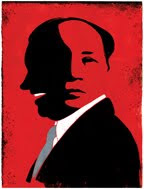 I am very pleased to turn today’s Nixon in China blog space over to Senator Jack Austin, a great friend of Vancouver Opera and a valued advisor to our Nixon in China project.
I am very pleased to turn today’s Nixon in China blog space over to Senator Jack Austin, a great friend of Vancouver Opera and a valued advisor to our Nixon in China project.Jack Austin has seen the changes in China year after year since 1971. As a Canadian Senator, he chaired the Canada China Legislative Association. From 1993 to 2000 he was President of the Canada China Business Council. Senator Austin has met and worked with every Premier of China from Zhou En-lai in 1971 to Wen Jiabao today.
Can anyone imagine today what China was like forty years ago when Canada and China exchanged diplomatic relations on October 13th, 1970, or when President Richard Nixon made his historic decision and traveled to China to meet Chairman Mao in 1972, or in the year the United States and China formally exchanged diplomatic relations, 1979, just thirty years ago?
Well, I can.
I had the good fortune in 1970, as Canadian Deputy Minister of Energy, Mines and Resources, to be a member of the Interdepartmental Committee on External Relations in Ottawa, which had the responsibility of advising on the terms of the recognition of China. I had no role in the negotiations but a front row seat on what was happening in the talks and of course on the background briefings on conditions in China at that time.
As a result of some very innovative negotiation an Agreement was reached which included provision for a first official level visit to China in June 1971 led by Canada's Minister of Industry, the Hon. Jean-Luc Pepin and supported by six Deputy Ministers of which I was one.
China in 1971 is unimaginable in today's terms. China had suffered greatly as a result of the Japanese invasion beginning in 1931 and ending in 1945. Postwar reconstruction had hardly begun when a civil war broke out ending in the establishment of the People's Republic of China in 1949. China then experienced series of economic and social events under the governance of the Communist Party which culminated in the Cultural Revolution of 1966-1976 led by the Gang of Four and carried out by the Red Guards. China in its own terms had "closed its door to the world" and sought little foreign presence in China.
You can then imagine how important an event was the exchange of recognition in 1970. China sought out Canada for its first step in rejoining the international community. Canada under Prime Minister Pierre Trudeau understood the importance of this step and wanted to foster that engagement. Again in Chinese terms, China was opening its door to the world, not having it broken down by the colonial powers as in it's previous history.
In 1970 China was a very poor country with one of the lowest personal incomes of its citizens in the world. It had no presence in the world organizations and very little international trade. Its technical advancement was behind that of most nations. What I found when we arrived in Beijing in 1971 was a city of few automobiles, millions of bicycles, and millions of people dressed in almost the same type of clothing. The buildings were not heated and there was no air-conditioning in the summer. By today's standards people were very uncomfortable whether at work or at home.
How is it that forty years later China is being compared to the United States as a global power? The world has never seen an economic, social, and political rise so rapid and so successful. China today is a key participant in global organizations, is one of the world's largest and most competitive global traders and is one of the stabilizing players in resisting the current global economic downturn. Partly it is China's own doing in harnessing the creative energy of 1.3 billion of its own people to sound economic and social policies. Partly it is the welcome the international community has given to China in rejoining the world system by billions of direct foreign investment, transfer of technology and the opening of global markets, not the least of which has been the United States domestic market for Chinese manufactures.
Critical to this opening and economic growth was the remarkable decision by President Nixon to reverse years of American foreign policy towards China, which had been negative and hard line, and seek a breakthrough for an era of engagement and interaction. Aided by the diplomatic work of National Security Director Henry Kissinger the visit to China by President Nixon in 1972 was an international bombshell and just as shocking to the American political community and public. Today this decision is recognized in the United States as brilliant and farsighted. No more important welcome and acceptance to the international community for China could have been delivered and no better way could have been fashioned than by the President of the United States personally going to China and treating Chairman Mao, in the eyes of the world, as a political equal. The symbolism was perfect for China and for President Nixon as well.
Thus it is fitting for The Vancouver Opera to recognize the opening of China to the world by presenting the American Opera Nixon in China. Canada led the way. The United States made the difference, and the world is a far better place to have China as a prospering and positive member of the international community. Vancouver is the "Gateway to the Pacific" for North America and our links to China are strong. Nixon in China is an expression of our recognition of the importance of history and of our aspirations for a prosperous and peaceful future.

0 Response to "A Few Words from Senator Jack Austin"